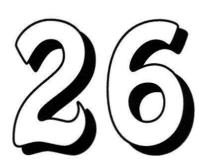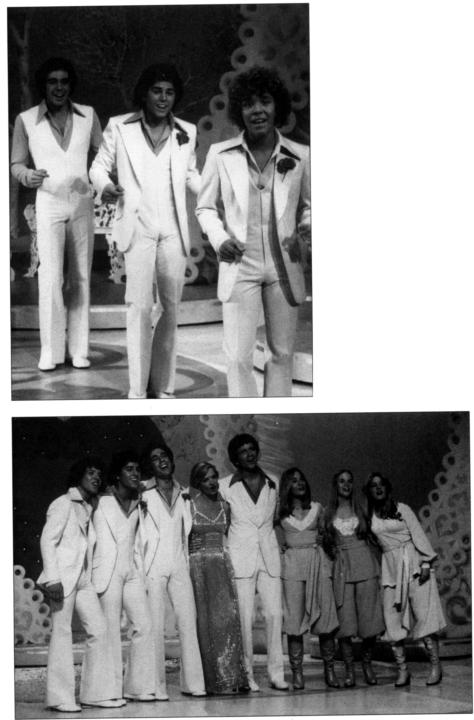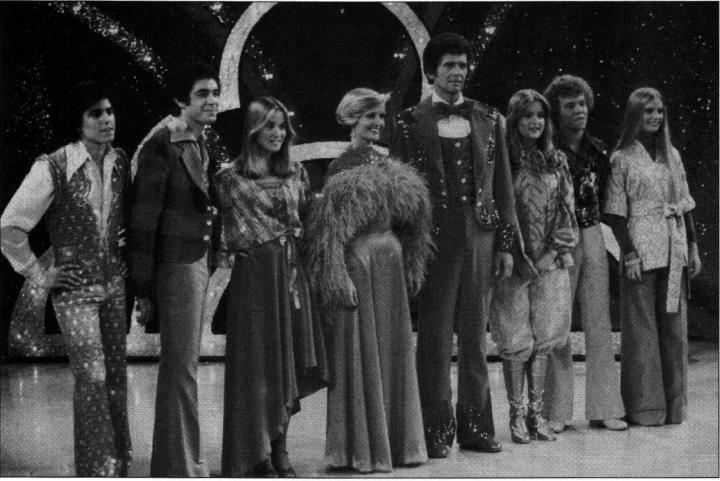Growing Up Brady: I Was a Teenage Greg, Special Collector's Edition (30 page)
Read Growing Up Brady: I Was a Teenage Greg, Special Collector's Edition Online
Authors: Barry Williams;Chris Kreski

"And now I'm thinking, `Oh my God, this is sooooo embarrassing,' and Eve's mortified and starts to cry, and I'm out there and
the cop says, `What would your parents say if they knew you were
up here?'-and that's the weirdest part of all, because actually, our
parents would probably have thought this was great, just great! I mean, Eve's folks really liked me, and forever my Mom had been
just plain nuts about Eve.
"Still, we drove home in silence, mumbled through an awkward
goodbye, and went our separate ways ... for good. I mean, I had
been a real dick, calling her from out of the blue with an attitude of
`service me,' we'd been traumatized by the surprise police visit,
and somehow the sum total of all the embarrassment we'd suffered through that night managed to keep us apart permanently.
"That's sad."
It's funny how your perspective changes with the passage of
time. I can fully understand how Chris and Eve's awkward adventure with the cops drove an embarrassed wedge between them, in
looking back it seems to me that what they were doing was completely natural, completely understandable, and exactly what normal teenagers should be doing. I mean, here were a couple of kids
who knew each other well, who felt safe and comfortable with
each other, and who were interested in something larger than a
solely physical relationship. What's wrong with that?
I also love the fact that the cops came and busted 'em up. I
mean, I know it sounds dumb, but I can't help thinking of the
whole escapade as a sort of R-rated episode of "The Brady Bunch."

 ineteen seventy-seven. The "Brady Bunch" is dead but
ineteen seventy-seven. The "Brady Bunch" is dead but
still alive, gone but not forgotten, canceled but still on
the air. Almost immediately after the Bunch bit the dust,
Sherwood Schwartz cashed in big and sold all 117 "Brady
Bunch"es into syndication. Now, instead of seeing the Bunch for a
half-hour each week, we could be found all over the dial, at all
times of the day. Thus, even though we'd been canceled, "The
Brady Bunch" continued to thrive as a living, breathing, somehow
current entity in the minds of tens of millions Americans.
That caused all kinds of repercussions. First of all, "The Brady
Bunch" ruled (and in a lot of markets still rules) syndication, consistently clobbering whatever sacrificial competition was lain in its
path. That caused ABC to take notice (industry gossip always maintained that our syndicated rebirth caused heads to roll off of
numerous ABC executives). Sherwood Schwartz, raking in huge
licensing fees, couldn't help noticing. And oh yeah ... one more
guy noticed what was happening, too. His name was Fred
Silverman.
Fred Silverman was the network executive responsible for television megahits like "Three's Company" and megaflops like
"Supertrain." He's also the man responsible for "The Brady Bunch
Hour." In many states he could be hanged for that.
That's because "The Brady Bunch Hour" was perhaps the single
worst television program in the history of the medium. The
premise, in a malodorous nutshell, asserted that the Bradys (at
Bobby's request) had given up their cozy suburban life-style, convinced their dad to quit the architectural rat race, and devoted
their lives to putting on the best darn variety show ever!
They didn't even come close.
To begin with, try to remember ABC's mid-seventies variety spectacular "Donny and Marie": huge white teeth, badly sung pop
hits, extra-cheesy comedy sketches, and the ice Vanities, a troupe
of big-busted skaters who'd glide around the Osmonds as they
smiled, sang, and waved. What you probably won't remember is
that "Donny and Marie" was a big hit for ABC at a time when the
network was fairly desperate for ratings. It consistently pulled in
very respectable Nielsen numbers, and week after week it served
as the building block of the network's Sunday-night lineup. One
particular Sunday night, the Brady Kids, were hauled out of retirement to appear as guest stars on "Donny and Marie," and a funny
thing happened: the Osmonds' Nielsens shot way up. So Fred
Silverman, then president of ABC, came to the decision to showcase the Bradys in a variety hour of their very own. Sherwood
Schwartz recalled: "Silverman calls Sid and Marty Krofft"-who
produced "Donny and Marie"-"and asks, `Can you do another
family-style variety show that would star the Brady family?' Now, of
course, when you're offered this kind of a deal you just say, `Sure,
no problem.' Doesn't matter if that's the truth or not-you just
say, `Sure, no problem. Where's my check?'
"So anyway, Fred Silverman says to them, `Great, let's sit down
and work out a deal,' and they did. Mind you, all of this went on
without the consent, or even the knowledge, of Paramount and
myself. But to do this new show, with characters that I had created
and that I owned, and to use a copyright that was owned jointly by
Paramount and myself, they couldn't get to square one without
our approval.
"So Marty Krofft calls me and says, `Let's make some kind of
arrangement.' So now what am I gonna do, sue him? And I've
always felt that you Brady people should make as much money as
you can from the show, and from the Brady name, so I gave in and
said, `Go ahead."'
So with Sherwood's blessing, the Kroffts set out to re-enlist
every one of us original Bradys. In my case, I was living in New
York, having just finished a Broadway run as "Pippin'," when I got
a call from Marty Krofft. "Barry baby," he hollered into the phone
excitedly, "we want to do a Brady Bunch variety hour, and you can
be the star!"
Usually, I know better than to believe anything a producer says,
but in this case I bought it! I took the bait hook, line, and sinker,
and within two weeks' time I'd packed up my things, said my
goodbyes, and flown myself back to Los Angeles.
Once I was there, however, my heart sank, my stomach
churned, and a sense of impending doom attached itself firmly to
my soul. Our show, even from day one, was being hastily thrown
together so that it could reach the airwaves quickly. It was also shaping up to be nothing more than a complete rip-off of "Donny
and Marie." There we were, back in the polyester jumpsuits, back
in the fringe, back in the sequins, and back on stage muddling
through the weirdest musical numbers imaginable.
Can you possibly comprehend what sort of twisted logic went
into having us Bradys perform a medley of "The Hustle" and "Love
to Love Ya Baby"? I couldn't, but that's exactly what we did in the
grand finale of the show's pilot. And believe it or not, the show
actually went downhill from there.
"The Brady Bunch Hour" was incredibly bad, but even more
incredible was the fact that Robert Reed (who you'd expect would
be foaming at the mouth about this mess) really enjoyed being on
it. I still couldn't figure that one out, so I recently asked Bob the
obvious question: why?
"I really did want to do it," he confessed. "I mean, I've studied
voice and dancing. I'm terrible at both, and proved it to be true,
but when Sid and Marty met with me, they described the whole
thing in very positive terms, and I thought, `What fun! This'll be a
hoot.' I knew you kids could sing and dance, and Florence obviously could sing, and so while I knew I wouldn't be very good at it,
I thought it might be fun to kind of go along for the ride. And
that's exactly what I did. I mean, I really was lousy, and always the
last to learn any new dance step, but to me it was fun. "
Still, it was gonna take a lot more than Robert Reed's enthusiasm to save this turkey. I mean, we rehearsed hard, working night
and day trying to pull this debacle into shape, but it didn't help.
Actually, the situation can best be described by employing the ageold Hollywood edict that "no matter how hard you try, you just
can't polish a turd."
By the time we'd spent a mere seven weeks fouling the airwaves, and embarrassing guests like Tina Turner, Farrah Fawcett,
Lee Majors, Tony Randall, Vincent Price, and Milton Berle, ABC had
seen enough. Our plug was mercifully yanked, and the American
viewing public was put out of its misery. The Bradys were once
again dead-this time for good ... maybe.
Flash forward to 1981. Disco's dead, Nancy Reagan has begun
redoing the White House, and the Bradys are clawing at their casket, trying to once again rise from the grave. This time around, the
call came while I was in Houston, performing in a really enjoyable
stage production of Grease. I pick up the phone, my agent tells me
that the Schwartzes have written a two-hour script called "The
Brady Girls Get Married" and that Paramount is interested in
shooting the thing. He also starts to tell me about how they'll be
using the end result as the pilot for a potential new series. I don't
think he'd even half-finished his sentence before I cut him off with a firm "Forget it!"

Those disco
Bradys.
((D Paramount
Pictures)

PIKES!
(© Paramount
Pictures)
Why? Simple. Y'see, by now, all of us kids had spent years trying
to move forward in our careers and live down the whole "Brady
Bunch" stigma. It wasn't easy, and despite a few successes, work
remained scarce for us Brady Kids. Eve had scored a couple of
good breaks with Dawn: Portrait of a Teenage Runaway, and
Little Women. Maureen appeared in a few teen movies like
Skatetown USA. and Moonshine County Express, and I had been
touring on stage in musical theater productions, but that was it.
The other three Brady's were now pretty much out of the business, and we all agreed that our only hope of surviving the unshakable typecasting was to keep ourselves far away from Bradyland.
On top of all that, from about 1977 through '81, the Bradys' idyllic
look at family life had become perceived as laughable, naive, and
vaguely threatening to the cynical sensibilities of the seventies. It
had been a long time since being a Brady was considered cool, it
had now become downright embarrassing.
